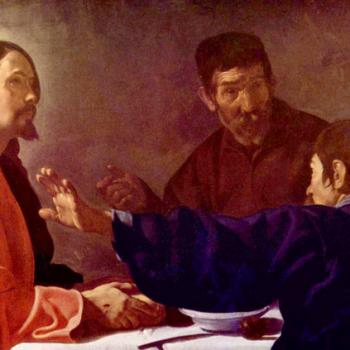Our theology has conditioned us. It has deepened the gulf between God and humanity to such an extent that when we see Jesus receiving divine acclamation, receiving the Spirit, exercising kingship over the satanic host, breaking bread for thousands upon thousands, receiving obeisance from his fellows, acting in the place of God in OT scripture texts, and even rising form the dead, that we see in such glorious moments hints of the divine.
And, surely, these hints are true. The divine is being made known precisely here.
But is it a hint and pointer toward the incarnation of a preexistent deity? Or might we be seeing in some of the Jesus stories a claim that for many modern Christians turns out to be a hundred times more scandalous? Might we be seeing, in fact, that Jesus in his glory and power is precisely what humanity was always meant to be?
We have become so concerned to protect Jesus’s divinity that most of us, yes I say most of us, have lost sight of the glory of his humanity.
He is not human just so he can enter the terrible state of human debt and sin and thereby die for us. This makes good sense of our atonement theology but finds only minimal resonance with the Jesus stories of Matthew, Mark, and Luke.
He is not human only behind the glory and power and rule, as a peasant teaching people to be nice to each other. This fits our liberal social justice theology well enough, but makes nonsense of the Jesus stories that the church has always told.
He is human in the kingship and the glory and the power that truly puts God on display in precisely the ways that God always wanted to be put on display in the world: through a faithful, image-bearing, human child, ruling the world as God would have it ruled.
Accenting the Right Syl•LA•ble
None of this is to deny the incarnation theology of the Gospel of John, or the hints at preexistence one might find here or there in Paul. 
But it is to say that our emphasis on the divine syllable of Jesus’s divine-human identity has left many of us mispronouncing that identity altogether, and foundering when it comes to making sense of the stories that put it most clearly on display.
The Synoptic Gospels are an invitation to see what human life lived in perfect harmony with the divine can be like. They do so by demonstrating the embodiment of this perfect humanity in the person of Jesus. And as they do so they all hint that the calling of Jesus’s followers is to take up our own part in that harmonious song.
Because they are stories about the human Jesus, they can become stories about us. At least, that must always be the impossible possibility we strive toward.
Jesus was the Messiah, and we are not. That will always be true. And this is what these stories are about.
And, as Messiah he is the human enthroned at God’s right hand, ruling the world on God’s behalf as God always intended humanity to be. This means that he rules over a kingdom whose subjects we are, and subjects of the same kind as him: spirit-possessing (possessed?) children of a divine parent.
The Plug
Yesterday I got my author copies of A Man Attested by God. You can grab yours by dropping a line to an independent bookseller, hopping over to Eerdmans.com where they are now in stock, or by hitting up the Evil Beast from whence they will be shipping next week from what I hear.
In this book I relentlessly pursue the thesis that Jewish writers saw humanity in its ideal forms as embodying the divine person and playing the divine role upon the earth. I then show how this plays out across the Synoptic Gospels.
I hope you’ll grab a copy and join me in this journey of rediscovering the human Jesus of the Synoptic Gospels. I think that not only our understanding of Jesus but our understanding of our own identity and destiny depends on feeding our imaginations on the sorts of ideas I lay out there.












